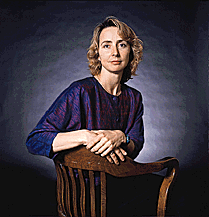

Somewhat later in her teaching career, the associate geography professor was lecturing about world geography using an overhead transparency of a globe. Throughout the class, she kept pointing to the globe. She was nervous but thought the lecture went well.
After class, a student told her that she had delivered the entire lecture with her transparency upside down and backwards.
Despite these setbacks, Lawson realized that she really loved teaching. "If there's a prayer of me making a difference in anything," she says, "it's through teaching and showing students how to read the world differently. Teaching is simply the most important work that we do."
Lawson, one of the winners of the 1996 Distinguished Teaching Award, specializes in the economic development of Latin America. A key to her teaching success, she says, is the energy in the classroom. "I try to present the world in a way that challenges people's everyday knowledge. As soon as you get them off center and ask them to question some received wisdom, you tap into their energy. I've learned how to play with that energy, to try and make people look at things differently."
One of the nicest compliments she has received came from a student who didn't agree with her point of view. It was a large class, about 150 students, and one of the brighter students had views fairly far right of center. ("Mine were usually on the other side," she says.) The student often challenge the thrust of the lecture. At the end of the quarter, he thanked Lawson for making him feel secure enough to make those comments. "It was a huge compliment," she says, "that I could create an environment in the classroom where all different perspectives could be heard."
One of the challenges Lawson faces is bring issues of international development "home" to her students. As a result, Lawson has become an advocate of service learning, where students do community service as part of their course work.
"It's a way to get the students' attention. One of the things that worries me about service learning is that some may think of the students as missionaries. I think of service learning very differently. The complexity of issues are brought forth in a way more forceful than I can do in the classroom." Students who study Latin America, for example, may volunteer to work with an immigrants' rights project. They bring what they have learned through volunteering back to the class.
In addition to her formal teaching load, Lawson spends a great deal of time after class and in her office talking to students, helping them think about majors, career paths and alternatives. Some of the most important learning, she says, takes place in those sessions. "It's not usually counted in a professor's teaching hours, but it should be."
There is no question that her dedication has made an impact on many lives. "Professor Lawson is the professor that has contributed most to my love for learning at this institution," one student writes. Says another, "I have learned more than just to be a better thinker, writer and student in Professor Lawson's classes. She encourages us to see the problems of the world in all its facets, not just one perspective. And because of that, I have become a better person."--Bob Roseth, Office of News and Information
Send a letter to the editor at columns@u.washington.edu.
Return to Best of 1996 Home Page